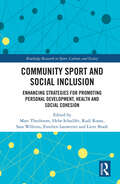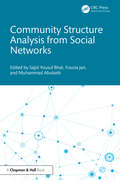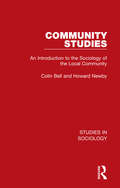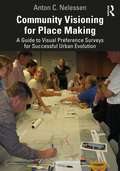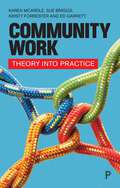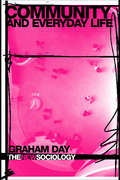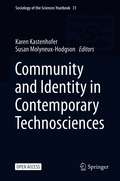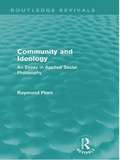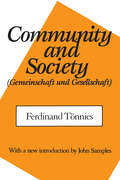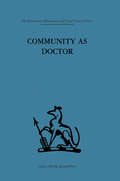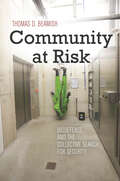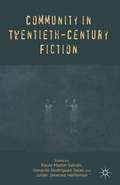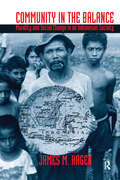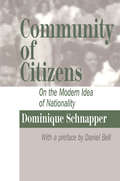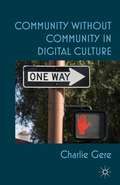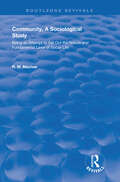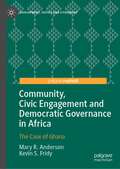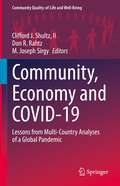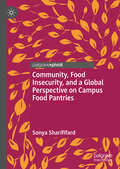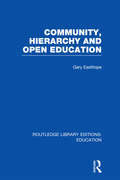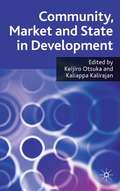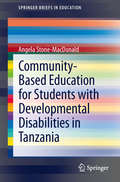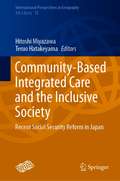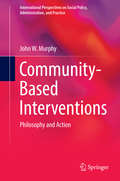- Table View
- List View
Community Sport and Social Inclusion: Enhancing Strategies for Promoting Personal Development, Health and Social Cohesion (Routledge Research in Sport, Culture and Society)
by Marc Theeboom Hebe Schaillée Rudi Roose Sara Willems Lieve Bradt Emelien LauwerierThis book examines sport as an inclusive and developmental environment, exploring the conditions by which community sport initiatives can promote personal development, health and social cohesion, particularly for at-risk youth. At the empirical core of the book is a multiple disciplinary study of community sport programmes in Flanders, Belgium, involving researchers from social sport sciences, social work, pedagogy and health care sciences. Drawing on this cutting-edge, realist research, the book considers the implications for sport development policy and practice around the world. The book considers community sport as a vehicle for promoting social inclusion, and the ways it allows people of all backgrounds and abilities to participate and access social and health benefits, whilst touching on key issues including monitoring and evaluation; exercise and health; youth welfare, and volunteering. This book is a fascinating reading for any student, researcher or practitioner working in sport for development, sport management, sport coaching, social work, education, sociology or urban studies.
Community Structure Analysis from Social Networks
by Sajid Yousuf Bhat, Fouzia Jan, and Muhammad AbulaishThis book addresses social and complex network analysis challenges, exploring social network structures, dynamic networks, and hierarchical communities. Emphasizing network structure heterogeneity, including directionality and dynamics, it covers community structure concepts like distinctness, overlap, and hierarchy. The book aims to present challenges and innovative solutions in community structure detection, incorporating diversity into problem-solving. Furthermore, it explores the applications of identified community structures within network analysis, offering insights into social network dynamics. Investigates the practical applications and uses of community structures identified from network analysis across various domains of real-world networks Highlights the challenges encountered in analyzing community structures and presents state-of-the-art approaches designed to address these challenges Spans into various domains like business intelligence, marketing, and epidemics, examining influential node detection and crime within social networks Explores methodologies for evaluating the quality and accuracy of community detection models Examines a diverse range of challenges and offers innovative solutions in the field of detecting community structures from social networks The book is a ready reference for researchers and scholars of Computer Science and Computational Social Systems working in the area of Community Structure Analysis from Social Network Data.
Community Studies: An Introduction to the Sociology of the Local Community (Studies in Sociology)
by Colin Bell Howard NewbyOriginally published in 1971, this was the first text on community studies which analysed the major empirical work in this field in a comparative perspective. It is concerned both with the sociology of community and the sociology of community studies. It takes both the findings of individual studies and the research process itself as significant sociological data in their own right, and it asks continually: how do we know what we know about communities? Community Studies is, then, not only a contribution to that particular field but also to our understanding of the interaction between theory and method in sociology. Studies are analysed from North and Latin America, Britain and Western Europe, and India. Two central problems, stratification and power, are considered at greater length. This book would prove to be an invaluable introduction not only for students of sociology but also for architects, planners and all those who had an interest in the community at the time. Its authors were, and had been, actively engaged in field research in this area.
Community Visioning for Place Making: A Guide to Visual Preference Surveys for Successful Urban Evolution
by Anton C. NelessenCommunity Visioning for Place Making is a groundbreaking guide to engaging with communities in order to design better public spaces. It provides a toolkit to encourage and assist organizations, municipalities, and neighborhoods in organizing visually based community participation workshops, used to evaluate their existing community and translate images into plans that embody their ideal characteristics of places and spaces. The book is based on results generated from hundreds of public participation visioning sessions in a broad range of cities and regions, portraying images of what people liked and disliked. These community visioning sessions have been instrumental in generating policies, physical plans, recommendations, and codes for adoption and implementation in a range of urban, suburban, and rural spaces, and the book serves as a bottom-up tool for designers and public officials to make decisions that make their communities more appealing. The book will appeal to community and neighborhood organizations, professional planners, social and psychological professionals, policy analysts, architects, urban designers, engineers, and municipal officials seeking an alternative vision for their future.
Community Work: Theory into Practice
by Sue Briggs Karen McArdle Kirsty Forrester Ed GarrettWritten by community workers from diverse contexts, this highly accessible guide equips practitioners and students working in a range of community settings to make the best use of theory in their work. The book focuses on the hope, excitement and possibilities that contemporary theory brings to practice and is essential reading for all those concerned with social justice, inclusion and equality. Drawing on voices from across the world, influential thinking, both old and new, is applied to the practice that underpins work with individuals, groups and communities. The book will inform and enhance practice for a wide range of students and professionals working in community contexts such as community development, adult education, youth work, community health and social work.
Community and Everyday Life
by Graham Day'Community' continues to be a persistent theme in political, philosophical and policy debates. The idea of community poses fundamental questions about social inclusion and exclusion, particular versus general interests, identity and belonging. As well as extensive theoretical literature in the social sciences, there is a rich body of social research aimed at exploring the nature of community, and evaluating its contribution to people's lives and well-being. Drawing on a wealth of international empirical examples and illustrations, this book reviews debates surrounding the idea of community. It examines changing patterns of community life and evaluates their importance for society and for individuals. As well as urban, rural and class-based communities, it explores other contemporary forms of community, such as social movements, communes and 'virtual' gatherings in cyberspace. Truly multidisciplinary, this book will be of interest to students of sociology, geography, political science and social policy and welfare. Grounded in a wide-ranging review of empirical research, it provides an overview of sociological debates surrounding the idea of community and relating them to the part community plays in people's everyday conceptions of identity.
Community and Identity in Ancient Egypt
by Deborah VischakThis book examines a group of twelve ancient Egyptian tombs (ca. 2300 BCE) in the elite Old Kingdom cemetery of Elephantine at Qubbet el-Hawa in modern Aswan. It develops an interdisciplinary approach to the material - drawing on methods from art history, archaeology, anthropology, and sociology, including agency theory, the role of style, the reflexive relationship between people and landscape, and the nature of locality and community identity. A careful examination of the architecture, setting, and unique text and image programs of these tombs in context provides a foundation for considering how ancient Egyptian provincial communities bonded to each other, developed shared identities within the broader Egyptian world, and expressed these identities through their personal forms of visual and material culture.
Community and Identity in Contemporary Technosciences (Sociology of the Sciences Yearbook #31)
by Karen Kastenhofer Susan Molyneux-HodgsonThis open access edited book provides new thinking on scientific identity formation. It thoroughly interrogates the concepts of community and identity, including both historical and contemporaneous analyses of several scientific fields. Chapters examine whether, and how, today’s scientific identities and communities are subject to fundamental changes, reacting to tangible shifts in research funding as well as more intangible transformations in our society’s understanding and expectations of technoscience. In so doing, this book reinvigorates the concept of scientific community. Readers will discover empirical analyses of newly emerging fields such as synthetic biology, systems biology and nanotechnology, and accounts of the evolution of theoretical conceptions of scientific identity and community. With inspiring examples of technoscientific identity work and community constellations, along with thought-provoking hypotheses and discussion, the work has a broad appeal. Those involved in science governance will benefit particularly from this book, and it has much to offer those in scholarly fields including sociology of science, science studies, philosophy of science and history of science, as well as teachers of science and scientists themselves.
Community and Ideology: An Essay in Applied Social Philosphy (Routledge Revivals)
by Raymond PlantInitially published in 1974, this is a work of applied social and political philosophy which relates the philsophical analysis to various forms of community work theory and practice. Raymond Plant emphasizes that 'community' has a wide range of both descriptive meanings and evaluative connotations, linking this dual role of the word in the description and evaluation of social experience to its history in ideological confrontations. The book takes account of some liberal criticisms of the community ideal, and finally seeks to re-state a theory of community compatible with a liberal ideology.
Community and Society
by Ferdinand Tonnies C.P. LoomisThis extraordinary prescient work by Ferdinand Toennies was written in 1887 for a small coterie of scholars, and over the next fifty years continued to grow in importance and adherents. Its translator into English, Charles P. Loomis, well described it as a volume which pointed back into the Middle Ages and ahead into the future in its attempt to answer the questions: "What are we? Where are we? Whence did we come? Where are we going?" If the questions seem portentous in the extreme, the answers Toennies provides are modest and compelling. Every major field from sociology, to psychology, to anthropology, has found this to be a praiseworthy book. The admirable translation by Professor Loomis did much to transfer praise for the Toennies text from the German to the English-speaking world. Now, outfitted with a brilliant new opening essay by John Samples, the author of a recent full-scale biographical work on Toennies, 'Community and Society' is back in print; a welcome reminder of the glorious past of German social science.
Community as Doctor: New perspectives on a therapeutic community (Historical Issues In Mental Health Ser.)
by Rhona Rapoport Robert N. Rapoport Irving RosowTavistock Press was established as a co-operative venture between the Tavistock Institute and Routledge & Kegan Paul (RKP) in the 1950s to produce a series of major contributions across the social sciences. This volume is part of a 2001 reissue of a selection of those important works which have since gone out of print, or are difficult to locate. Published by Routledge, 112 volumes in total are being brought together under the name The International Behavioural and Social Sciences Library: Classics from the Tavistock Press. Reproduced here in facsimile, this volume was originally published in 1960 and is available individually. The collection is also available in a number of themed mini-sets of between 5 and 13 volumes, or as a complete collection.
Community at Risk: Biodefense and the Collective Search for Security
by Thomas D. BeamishIn 2001, following the events of September 11 and the Anthrax attacks, the United States government began an aggressive campaign to secure the nation against biological catastrophe. Its agenda included building National Biocontainment Laboratories (NBLs), secure facilities intended for research on biodefense applications, at participating universities around the country. In Community at Risk, Thomas D. Beamish examines the civic response to local universities' plans to develop NBLs in three communities: Roxbury, MA; Davis, CA; and Galveston, TX. At a time when the country's anxiety over its security had peaked, reactions to the biolabs ranged from vocal public opposition to acceptance and embrace. He argues that these divergent responses can be accounted for by the civic conventions, relations, and virtues specific to each locale. Together, these elements clustered, providing a foundation for public dialogue. In contrast to conventional micro- and macro-level accounts of how risk is perceived and managed, Beamish's analysis of each case reveals the pivotal role played by meso-level contexts and political dynamics. Community at Risk provides a new framework for understanding risk disputes and their prevalence in American civic life.
Community in Twentieth-Century Fiction
by Paula Martín Salván Gerardo Rodríguez Salas Julián Jiménez HeffernanThis book focuses on the imaginary construction and deconstruction of human communities in modern and contemporary fiction. Drawing on recent theoretical debate on the notion of community (Nancy, Blanchot, Badiou, Esposito), this collection examines narratives by Joyce, Mansfield, Davies, Naipaul, DeLillo, Atwood and others.
Community in the Balance: Morality and Social Change in an Indonesian Society
by James HagenCommunity in the Balance presents a fresh perspective on some classic social science issues. It examines the conflicts and tensions that permeate day-to-day interactions of a people in a remote region of the eastern Indonesian province of Maluku. The Maneo openly tout the pleasures of living alone in the forests of Seram away from the demands of kith and kin and the scrutiny that comes from life in villages in close proximity. The option is real. Yet while the incessant social demands and low-level enmities they attribute to village life are also felt, most acutely in the peril of sorcery, the accounts of strife are exaggerated to help establish the mutuality of the terms on which people do associate-as a collective sacrifice and virtue. Drawing on Aristotelian ideas of morality and exploring the modalities of recognition, desire, and displacement, the book focuses on the strategies of negotiation and obfuscation Maneo employ to foster community life. As volition is central to moral practice, the book's analysis of the subsequent religious conflagration that swept the province between 1999 and 2002 illuminates how fears and rumors of attack narrowed options that might otherwise have enabled enough people to opt out, condemn the violence, and perhaps contain it.
Community of Citizens: On the Modern Idea of Nationality
by Dominique SchnapperIn this critically acclaimed work, for which she was awarded the Prix de L'Assemblee Nationale in 1994, sociologist Dominique Schnapper offers a learned and concise antidote to contemporary assaults on the nation. Schnapper's arguments on behalf of the modern nation represent at once a learned history of the national ideal, a powerful rejoinder to its contemporary critics, and a masterful essay in the sociological tradition of Ernest Renan, Alexis de Tocqueville, Emile Durkheim, and Raymond Aron. If Schnapper asserts, the fate of liberal democracy is coterminous with that of the national ideal, then the nation's fate—and the answer to this question—must be of pressing interest to us all. Reflecting deeply on both the nation's past and future, Schnapper places her hopes in what she terms "the community of citizens."No mere exercise in sociological abstraction, Schnapper's case for the nation also entails a practical political objective. In a time of radical difference, the national ideal may be the last, great social unifier. This book deserves a place alongside the works of Elie Kedourie, Ernest Gellner, Anthony Smith, and other classics in the study of nationalism and nationality. This work will be of interest to sociologists, historians, and political scientists alike.
Community without Community in Digital Culture
by Charlie GereCommunity Without Community in Digital Culture presents the view that our digital culture is determined not by greater connection, but by the separation and gap that is a necessary concomitant of our fundamental technicity.
Community, A Sociological Study: Being an Attempt to Set Out the Nature and Fundamental Laws of Social Life (Routledge Revivals)
by Robert M. MacIverFirst published in 1917, this work seeks to be an introduction to the concept of community, the term which best expresses the object which social science as such endeavours to study; it is in community, the common life, that the interests represented by the specific social sciences are bound together, made integral, and thus amenable to a more comprehensive science. Community, A Sociological Study, includes an examination on the false perspectives of community, the elements of community, the structure of community and institutions.
Community, Civic Engagement and Democratic Governance in Africa: The Case of Ghana (Development, Justice and Citizenship)
by Mary R. Anderson Kevin S. FridyThis book explores how community influences civic engagement, focusing on the case of Ghana. It offers an interdisciplinary perspective to those studying psychology, political development and civic engagement in African countries. Previous research has shown that the social and economic context in which an individual interacts influences their political behaviors and attitudes, and that personal characteristics account for differences in political behavior and attitudes. This work moves away from the cultural demographics of a person, which often take center stage in existing investigations of partisan political behavior in the African context, and addresses the following five questions: (1) To what extent do individual traits influence civic engagement in Ghana? (2) To what extent is community identity similar or different in small rural villages versus large metropolitan areas in Ghana and how does community identity influence civic engagement? (3) To what extent does trust influence civic engagement in Ghana? (4) What factors and activities influence political knowledge and how does political knowledge influence civic engagement? (5) What is the status of women in civic engagement?
Community, Economy and COVID-19: Lessons from Multi-Country Analyses of a Global Pandemic (Community Quality-of-Life and Well-Being)
by M. Joseph Sirgy Don R. Rahtz Clifford J. Shultz IIThis volume explores the impact of the COVID-19 pandemic on the health, safety, and socioeconomic well-being of community residents of selected countries around the world. It is built on an overarching framework of studying community well-being, applied here to the analyses of one of the most significant crises of our time. Most important are the lessons learned from the experiences in these countries – including insights and recommendations on how to mitigate future pandemics. Building on years of research, each chapter is written by an accomplished scholar with interests and expertise on various assessments of community well-being development in the country of study. The authors share cases and analyses, and highlight failures and successes; they offer sound policy recommendations on how to restore the health, safety, and multidimensional wellness of community residents, and how to decrease the likelihood and impact of future crises. Some of the policy recommendations in this multi-country compendium can be used to assist crisis prevention and recovery, beyond pandemics. The volume shows how the lessons learned and shared from community responses to the pandemic can provide critical and useful policy insights to shape best practices in mitigating other disasters like hurricanes, floods, earthquakes, tornadoes, wars, riots, acts of domestic and international terrorism, weapons of mass destruction and industrial accidents. This is a must-read for researchers across the social sciences, health sciences, and management studies, and for government and non-government professionals involved in community health and well-being.
Community, Food Insecurity, and a Global Perspective on Campus Food Pantries
by Sonya SharififardThis book explores food accessibility and its relationship to food security in communities representing high populations of college and university students. Each chapter offers readers a vivid and multifaceted perspective on food practices' cultural and social complexities and the current food system. Using insights from the multidisciplinary fields of food studies, educational leadership, and human geography, this book engages the global paradoxes of food. Food is individual and community-based, and students participating in school activities and extracurriculars must often choose between affording books or food. Each chapter begins with a case study and ends with suggested resources and activities. Chapter topics include academic success, identity and belonging, groceries, food media, public health, marketing, surplus and scarcity, and social impact. The book further blends concepts and empirical accounts to address the central issues of culture, structure, and accessibility within and among the food retail environment.
Community, Hierarchy and Open Education (Routledge Library Editions: Education)
by Gary EasthopeThe book describes the English school, especially the secondary school, as a hierarchical community in which the head-teacher (principal) is an autocratic ruler. After explaining how that particular organisation of the school developed historically from the market situation faced by the English public (i.e. private) schools in the developing industrial society of the nineteenth century it provides empirical evidence demonstrating that the hierarchies of knowledge, teachers and students that developed then were still in place when the book was published in 1975. They are still present today. It also looks at the challenges to the school as a hierarchical community presented by the ideologies of deschooling, progressive education and open education. Finally, it provides an explanation of why these ideologies were never put into practice in English schools despite some pioneering exemplars. Although first published over thirty-five years ago the issues examined in it raise questions that are still central to education today: Does size of school affect the commitment of teachers to the school, their colleagues and their students? How can the teaching staff be organised in a school? Do all need to work to the same ends? What is the role of leadership from the head-teacher (principal) in this? Is it possible to have a curriculum that is open without losing rigour? What should be the relationship between using local community knowledge and the educational wish to extend students’ horizons? The result is a short, nuanced, and densely argued text that demands thought and reflection from any contemporary educator.
Community, Market and State in Development
by Keijiro Otsuka Kaliappa Kalirajan'How to combine the community, the market, and the state in the total economic system is probably the most important agenda for economists geared towards the reduction of poverty in developing economies'. - Professor Yujiro HayamiThis volume brings together leading scholars from all around the world to examine and extend Professor Hayami's development model of 'community, market and state', and to pay tribute to his invaluable contribution to economics. The authors provide new empirical analysis with a clear focus on the role of the community in economic development, and its relations with agricultural markets, industrialization and the government, using primary data from major countries in Asia and Africa. This book is indispensable reading for all interested in development economics, government and market studies and international development studies.
Community-Based Education for Students with Developmental Disabilities in Tanzania (SpringerBriefs in Education)
by Angela Stone-MacdonaldBased on a yearlong ethnographic study, this book describes the daily life and work of the Irente Rainbow School, a special education school for students with developmental disabilities in Lushoto, Tanzania. It examines the use of local context, community funds of knowledge, culturally relevant pedagogy, and community support to teach students with disabilities important life skills, independence, self-advocacy and to fight for their human rights. This book offers several lessons for different audiences; it is a primer on disability and education in a rural African town, an alternative model for non-governmental agencies to consider in designing community-based and community-engaged programs, and a story about an exceptional group of teachers, students and families who took action to provide an education and a realization of rights for children with disabilities.
Community-Based Integrated Care and the Inclusive Society: Recent Social Security Reform in Japan (International Perspectives in Geography #12)
by Hitoshi Miyazawa Teruo HatakeyamaThis book discusses the building of comprehensive community support systems, which constitutes a key issue in social security reforms in Japan. The book comprises three parts: (I) Mapping Social Security in Japan, (II) Community-Based Integrated Care Systems in Japan, and (III) A Prospect of Community-Based Inclusive Society in Japan. The chapters in this book were composed on the basis of research into community-based integrated care systems and community-based inclusive society, conducted by members of the Association of Japanese Geographers’ Study Group “Regional Issues Related to the Birthrate Decline and Population Aging.” Choosing local governments with different regional characteristics, the authors conducted empirical research to uncover the characteristics of comprehensive community support systems, building processes, and challenges in the respective local governments. Non-Japanese readers will acquire an understanding of the characteristics of social security and the trends of the reforms in Japan. To support its use as a reference book, chapters in Part I include numerous maps and figures with the themes of welfare, medical care, and health levels in Japan.
Community-Based Interventions: Philosophy and Action (International Perspectives on Social Policy, Administration, and Practice)
by John W. MurphyFor decades, community-centered social services have been promoted as an admirable ideal. Yet the concept of decentralized services delivered where people live has proved to be an elusive ideal as well, with the promise of empowerment often giving way to disinterest and apathy. Community-Based Interventions examines the reasons community programs tend to founder and proposes a realistic framework for sustained success. The book's theoretical, philosophical and political foundations begin with the importance of context, as in local knowledge and community self-definition and engagement. Innovative, often startling, approaches to planning, design and implementation begin with the recognition that communities are not "targets" or "locations" to be "fixed," but social realities whose issues require concrete answers. The variety of examples described in these chapters demonstrate the power of community interventions in providing effective services, reducing inequities and giving individuals greater control over their health, their environment and in the long run, their lives. Included in the coverage: Redefining community: the social dimensions. A new epidemiology to inform community work. The role of research in designing community interventions. The conceptual flow of a community-based project. Building autonomy through leadership from below. Relating social interventions to social justice. Attuned to the current era of health and mental health reform, Community-Based Interventions represents a major step forward in its field and makes an inspiring text for social workers, clinical social workers, public health administrators and community activists.
